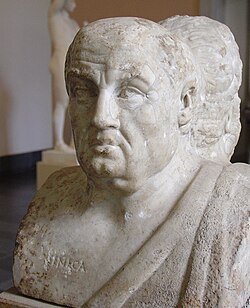Lucius Annaeus Seneca Quote
In war, when a commander becomes so bereft of reason and perspective that he fails to understand the dependence of arms on Divine guidance, he no longer deserves victory.
Lucius Annaeus Seneca
In war, when a commander becomes so bereft of reason and perspective that he fails to understand the dependence of arms on Divine guidance, he no longer deserves victory.
Related Quotes
Let my silence grow with noise as pregnant mothers grow with life. Let my silence permeate these walls as sunlight permeates a home. Let the silence rise from unwatered graves and craters left by bomb...
Kamand Kojouri
Tags:
abuse, abused, activism, activism poems, activist, amnesty, bellies, bombs, broken hearts, coming together
Attempts to locate oneself within history are as natural, and as absurd, as attempts to locate oneself within astronomy. On the day that I was born, 13 April 1949, nineteen senior Nazi officials were...
Christopher Hitchens
Tags:
alcohol, alcoholism, andrei gromyko, antisemitism, astrology, astronomy, beijing, birth, birthdays, breastfeeding
About Lucius Annaeus Seneca
Lucius Annaeus Seneca the Younger ( SEN-ik-ə; c. 4 BC – AD 65), usually known mononymously as Seneca, was a Stoic philosopher of Ancient Rome, a statesman, dramatist, and in one work, satirist, from the post-Augustan age of Latin literature.
Seneca was born in Colonia Patricia Corduba in Hispania, and was trained in rhetoric and philosophy in Rome. His father was Seneca the Elder, his elder brother was Lucius Junius Gallio Annaeanus, and his nephew was the poet Lucan. In AD 41, Seneca was exiled to the island of Corsica under emperor Claudius, but was allowed to return in 49 to become a tutor to Nero. When Nero became emperor in 54, Seneca became his advisor and, together with the praetorian prefect Sextus Afranius Burrus, provided competent government for the first five years of Nero's reign. Seneca's influence over Nero declined with time, and in 65 Seneca was executed by forced suicide for alleged complicity in the Pisonian conspiracy to assassinate Nero, of which he was probably innocent. His stoic and calm suicide has become the subject of numerous paintings.
As a writer, Seneca is known for his philosophical works, and for his plays, which are all tragedies. His prose works include 12 essays and 124 letters dealing with moral issues. These writings constitute one of the most important bodies of primary material for ancient Stoicism. As a tragedian, he is best known for plays such as his Medea, Thyestes, and Phaedra. Seneca had an immense influence on later generations—during the Renaissance he was "a sage admired and venerated as an oracle of moral, even of Christian edification; a master of literary style and a model [for] dramatic art."
Seneca was born in Colonia Patricia Corduba in Hispania, and was trained in rhetoric and philosophy in Rome. His father was Seneca the Elder, his elder brother was Lucius Junius Gallio Annaeanus, and his nephew was the poet Lucan. In AD 41, Seneca was exiled to the island of Corsica under emperor Claudius, but was allowed to return in 49 to become a tutor to Nero. When Nero became emperor in 54, Seneca became his advisor and, together with the praetorian prefect Sextus Afranius Burrus, provided competent government for the first five years of Nero's reign. Seneca's influence over Nero declined with time, and in 65 Seneca was executed by forced suicide for alleged complicity in the Pisonian conspiracy to assassinate Nero, of which he was probably innocent. His stoic and calm suicide has become the subject of numerous paintings.
As a writer, Seneca is known for his philosophical works, and for his plays, which are all tragedies. His prose works include 12 essays and 124 letters dealing with moral issues. These writings constitute one of the most important bodies of primary material for ancient Stoicism. As a tragedian, he is best known for plays such as his Medea, Thyestes, and Phaedra. Seneca had an immense influence on later generations—during the Renaissance he was "a sage admired and venerated as an oracle of moral, even of Christian edification; a master of literary style and a model [for] dramatic art."
